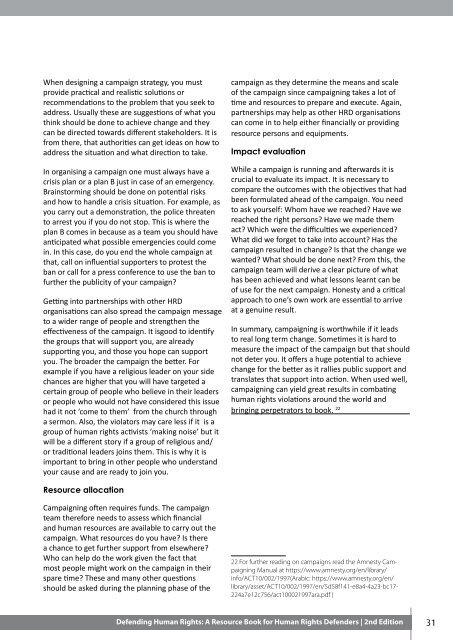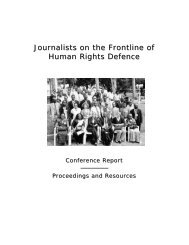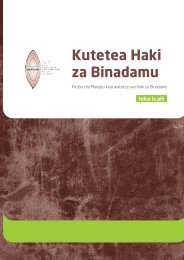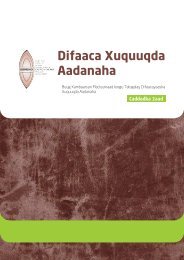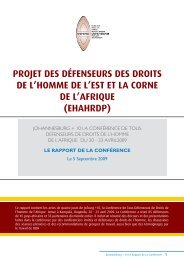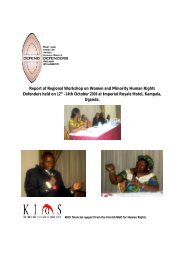Defending Human Rights: A Resource Book for Human
Defending Human Rights: A Resource Book for Human
Defending Human Rights: A Resource Book for Human
Create successful ePaper yourself
Turn your PDF publications into a flip-book with our unique Google optimized e-Paper software.
When designing a campaign strategy, you must<br />
provide practical and realistic solutions or<br />
recommendations to the problem that you seek to<br />
address. Usually these are suggestions of what you<br />
think should be done to achieve change and they<br />
can be directed towards different stakeholders. It is<br />
from there, that authorities can get ideas on how to<br />
address the situation and what direction to take.<br />
In organising a campaign one must always have a<br />
crisis plan or a plan B just in case of an emergency.<br />
Brainstorming should be done on potential risks<br />
and how to handle a crisis situation. For example, as<br />
you carry out a demonstration, the police threaten<br />
to arrest you if you do not stop. This is where the<br />
plan B comes in because as a team you should have<br />
anticipated what possible emergencies could come<br />
in. In this case, do you end the whole campaign at<br />
that, call on influential supporters to protest the<br />
ban or call <strong>for</strong> a press conference to use the ban to<br />
further the publicity of your campaign<br />
Getting into partnerships with other HRD<br />
organisations can also spread the campaign message<br />
to a wider range of people and strengthen the<br />
effectiveness of the campaign. It isgood to identify<br />
the groups that will support you, are already<br />
supporting you, and those you hope can support<br />
you. The broader the campaign the better. For<br />
example if you have a religious leader on your side<br />
chances are higher that you will have targeted a<br />
certain group of people who believe in their leaders<br />
or people who would not have considered this issue<br />
had it not ‘come to them’ from the church through<br />
a sermon. Also, the violators may care less if it is a<br />
group of human rights activists ‘making noise’ but it<br />
will be a different story if a group of religious and/<br />
or traditional leaders joins them. This is why it is<br />
important to bring in other people who understand<br />
your cause and are ready to join you.<br />
campaign as they determine the means and scale<br />
of the campaign since campaigning takes a lot of<br />
time and resources to prepare and execute. Again,<br />
partnerships may help as other HRD organisations<br />
can come in to help either financially or providing<br />
resource persons and equipments.<br />
Impact evaluation<br />
While a campaign is running and afterwards it is<br />
crucial to evaluate its impact. It is necessary to<br />
compare the outcomes with the objectives that had<br />
been <strong>for</strong>mulated ahead of the campaign. You need<br />
to ask yourself: Whom have we reached Have we<br />
reached the right persons Have we made them<br />
act Which were the difficulties we experienced<br />
What did we <strong>for</strong>get to take into account Has the<br />
campaign resulted in change Is that the change we<br />
wanted What should be done next From this, the<br />
campaign team will derive a clear picture of what<br />
has been achieved and what lessons learnt can be<br />
of use <strong>for</strong> the next campaign. Honesty and a critical<br />
approach to one’s own work are essential to arrive<br />
at a genuine result.<br />
In summary, campaigning is worthwhile if it leads<br />
to real long term change. Sometimes it is hard to<br />
measure the impact of the campaign but that should<br />
not deter you. It offers a huge potential to achieve<br />
change <strong>for</strong> the better as it rallies public support and<br />
translates that support into action. When used well,<br />
campaigning can yield great results in combating<br />
human rights violations around the world and<br />
bringing perpetrators to book. 22<br />
<strong>Resource</strong> allocation<br />
Campaigning often requires funds. The campaign<br />
team there<strong>for</strong>e needs to assess which financial<br />
and human resources are available to carry out the<br />
campaign. What resources do you have Is there<br />
a chance to get further support from elsewhere<br />
Who can help do the work given the fact that<br />
most people might work on the campaign in their<br />
spare time These and many other questions<br />
should be asked during the planning phase of the<br />
22 For further reading on campaigns read the Amnesty Campaigning<br />
Manual at https://www.amnesty.org/en/library/<br />
info/ACT10/002/1997(Arabic: https://www.amnesty.org/en/<br />
library/asset/ACT10/002/1997/en/5d58f141-e8a4-4a23-bc17-<br />
224a7e12c756/act100021997ara.pdf )<br />
<strong>Defending</strong> <strong>Human</strong> <strong>Rights</strong>: A <strong>Resource</strong> <strong>Book</strong> <strong>for</strong> <strong>Human</strong> <strong>Rights</strong> Defenders | 2nd Edition 31


